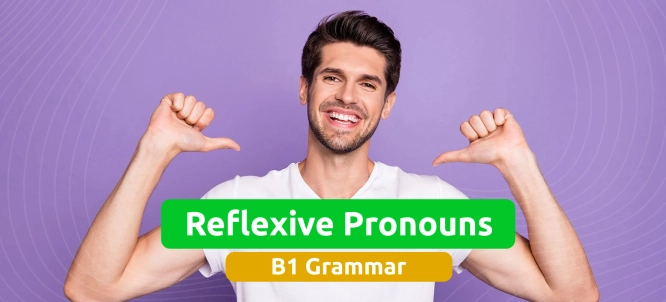by PushtoLearn
Reflexive Pronouns – myself, yourself
Table of Contents
Reflexive Pronouns – Exercises
These exercises focus on Reflexive Pronouns
What Are Reflexive Pronouns?
Reflexive pronouns are used when the subject and the object of a sentence are the same person or thing. In English, they end with -self (singular) or -selves (plural).
List of Reflexive Pronouns
|
Subject Pronoun |
Reflexive Pronoun |
|
I |
myself |
|
You (singular/plural) |
yourself/yourselves |
|
He |
himself |
|
She |
herself |
|
It |
itself |
|
We |
ourselves |
|
They |
themselves |

How to Use Reflexive Pronouns
1. When the Subject and Object Are the Same
Use reflexive pronouns to show that the subject and object are the same person or thing.
-
Example 1: "I taught myself to play the guitar." (The subject "I" and the object "myself" are the same.)
-
Example 2: "She hurt herself while cooking."
2. For Emphasis
Use reflexive pronouns to emphasize the subject or object of the sentence.
-
Example 1: "I’ll do it myself!" (Emphasis that no one else will do it.)
-
Example 2: "The CEO signed the contract himself."
3. To Express Actions Done Alone
Reflexive pronouns can show that someone does something without help.
-
Example: "They built the house by themselves."
Rules for Reflexive Pronouns
-
Agreement:
-
The reflexive pronoun must match the subject in both number (singular/plural) and gender.
-
Example: "He blames himself." (Not "herself" or "themselves.")
-
No Reflexive Pronoun for General Actions:
-
Do not use reflexive pronouns when the subject and object are different.
-
Correct: "I see you."
-
Incorrect: "I see myself." (Unless you are literally looking at yourself.)
-
Use with Prepositions:
-
Reflexive pronouns often follow prepositions to clarify meaning.
-
Example: "She kept the secret to herself."
Common Errors to Avoid
|
Error |
Why It’s Wrong |
Correct Version |
|
"He hurt hisself." |
"Hisself" is not a word; use "himself." |
"He hurt himself." |
|
"They prepared the meal theirselves." |
"Theirselves" is not a word; use "themselves." |
"They prepared the meal themselves." |
|
"You should blame yourselfs." |
Reflexive pronouns must agree with the subject. |
"You should blame yourselves." (plural) |
|
"I hurt me." |
Reflexive pronoun is required if the subject and object are the same. |
"I hurt myself." |
Everyday Use of Reflexive Pronouns
-
Describing personal actions:
-
"I enjoy spending time by myself."
-
"She talks to herself when she’s nervous."
-
Adding emphasis:
-
"The kids cleaned the room themselves."
-
"The president wrote the speech himself."
-
Expressing independence:
-
"He prefers to travel by himself."
-
"We completed the project all by ourselves."
Reciprocal Pronouns
What Are Reciprocal Pronouns?
Reciprocal pronouns describe actions or feelings that are mutual between two or more people. In English, there are only two reciprocal pronouns:
-
Each other
-
One another
When to Use Reciprocal Pronouns
-
To Show Shared Actions or Feelings:
-
"John and Sarah love each other." (John loves Sarah, and Sarah loves John.)
-
"The neighbors help one another with gardening."
-
In Groups of Two or More:
-
"We should respect each other’s opinions." (Used for two or more people.)
-
"The players congratulated one another after the match." (Used for more than two people.)
Key Difference:
While each other and one another are often interchangeable, each other is commonly used for two people, and one another is preferred for more than two.
Differences Between Reflexive and Reciprocal Pronouns
|
Feature |
Reflexive Pronouns |
Reciprocal Pronouns |
|
Definition |
Shows the subject acts on itself. |
Shows mutual actions or feelings. |
|
Examples |
"I cut myself while cooking." |
"They care for each other." |
|
Number of Forms |
Seven (myself, yourself, etc.) |
Two (each other, one another) |
|
Common Use |
Actions, emphasis, prepositions |
Mutual relationships or interactions |
FAQ
When should I not use reflexive pronouns?
Do not use reflexive pronouns unless the subject and object are the same. For example, say, "I saw him," not "I saw myself" (unless you're literally referring to yourself).
What’s the difference between "by myself" and "myself"?
-
"By myself" means alone. Example: "I did the homework by myself."
-
"Myself" is used for emphasis or reflexive actions. Example: "I hurt myself."
Can reflexive pronouns be used in passive sentences?
Yes, but it’s rare. Example: "The book was signed by the author himself."
Is "hisself" or "theirselves" ever correct?
No, these are incorrect forms. Always use "himself" and "themselves."
How can I practice reflexive pronouns?
Write sentences about your daily routine and actions. For example:
-
"I wake myself up at 7 a.m."
-
"She made breakfast for herself."

